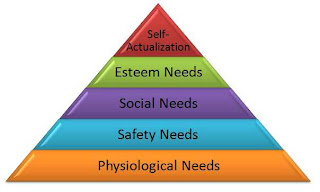One of the most widely know theories of motivation is the hierarchy of need theory, developed by psychologist Abraham Maslow and populerized during the early 1960’s. It argues that individual needs form a five-level hierarchy.
According to this heirarchy, our first need is for survival, so we concerntrate on basic phsycological needs, such as food, water, until we feel fairly sure that these needs are covered. Next, we concern ourselves with safety needs, which pertain to the desire to feel safe, secure, and free from threats to our existence. Once we feel reasonably safe and secure, we turn our atention to relationships with others in order to fulfill our belongingness needs, which involve the desire to affiliate with and be accepted by others.
With support from loved ones, we focus on esteem needs, which are related to the two-pronged desire to have a positive self-image and to have our contributions valued and appreciated by others. Finally, we reach the highest level, self-actualization needs, which pertain to the requirment of developing our capabilities and our creativity, seeing our inovative ideas translated into reality, pursuing new knowledge, and developing our talents in uncharted directions. Needs at this level highest level are never completely fulfiled, because as we work to develop our capabilities, both our potential and our needs for self actualization grow stronger.



0 comments:
Posting Komentar